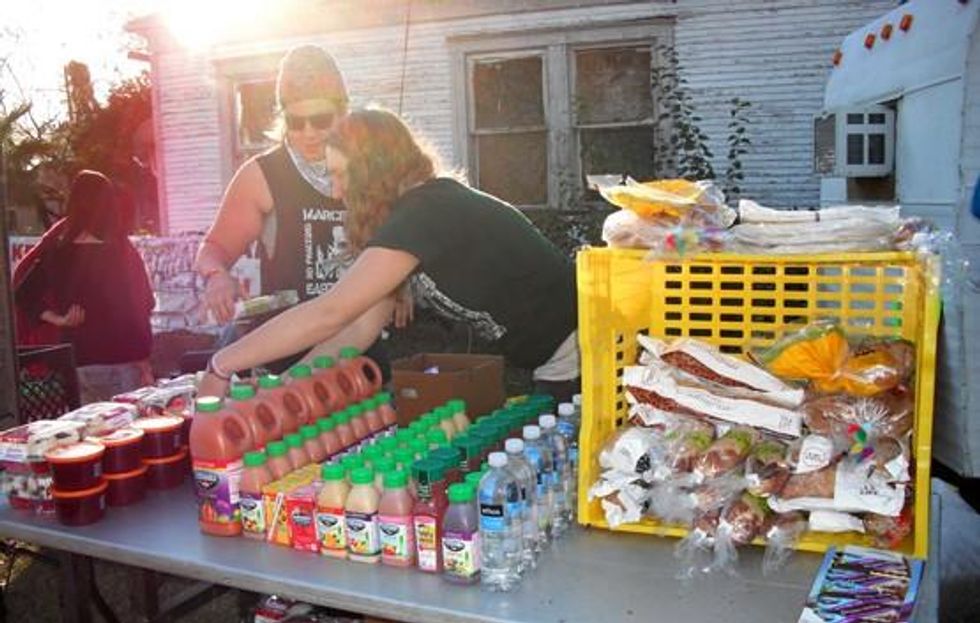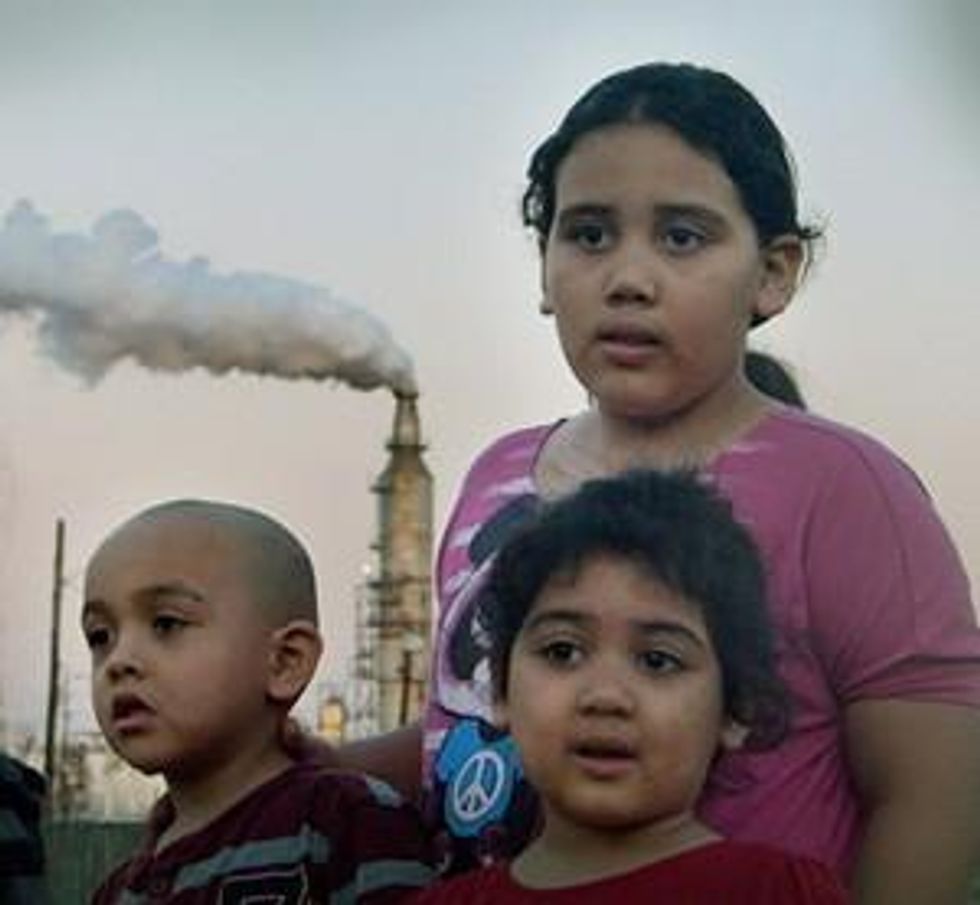The playground in Manchester, a neighborhood on Houston's east side, is empty much of the time. Children who play for too long here often start to cough. They go back inside, leaving an empty swing set in the shadow of a nearby oil refinery.
For the residents of Manchesters, the effects of the Keystone XL pipeline will be right next door.
Yudith Nieto, 24, has lived in Manchester since her family came from Mexico when she was a small child. While it's OK to visit the playground, she says, it's not OK to bring her camera. On several occasions, security guards from the Valero refinery next door have appeared and ask her to leave, claiming that taking pictures in the park was "illegal." They've even brought in Houston police as reinforcements. Valero, one of the major oil companies operating in this industrial part of Houston, keeps its security busy: Nieto says that they have harassed documentary filmmakers and journalists. And when college students participating in an "alternative spring break" program came to the park to talk to her about the neighborhood's problems, a guard drove up in an unmarked vehicle and took video of the meeting on his cellphone."I'm not afraid of the attention I'm getting from these people," Nieto says, "because we want people to know that we're aware."
Manchester, one of Houston's oldest neighborhoods, is surrounded by industry on all sides: a Rhodia chemical plant; a car crushing facility; a water treatment plant; a train yard for hazardous cargo; a Goodyear synthetic rubber plant; oil refineries belonging to Lyondell Basell, Valero, and Texas Petro-Chemicals; as well as one of the busiest highways in the city. Industrial development continues uninterrupted down the Houston Ship Channel for another 50 miles south to the Gulf of Mexico. The refineries around Houston have been called the "keystone to Keystone" because they're expected to process 90 percent of tar sands crude from Alberta if the controversial Keystone XL pipeline is completed.
It's one of the most polluted neighborhoods in the U.S., one where smokestacks grace every backyard view. But it's taking on a new significance as the terminus of Keystone because the pipeline is at the center of the highest-stakes environmental battle in recent years. As international pressure builds, residents are beginning to organize, educate themselves, and speak out for the health of their families.
For them, the struggle over Keystone not a political game. It's not even about climate change, at least not exclusively. The effects of the pipeline will be right next door.
A grassroots movement begins to grow
Manchester is in some ways typical of low-income urban neighborhoods: it's almost entirely Latino and African American, with a large number of undocumented immigrants. A full third of residents live below the poverty line. Drugs, unemployment, and gangs are a problem. And there's a strange smell in the air: sometimes sweet, sometimes sulfurous, often reeking of diesel. The most striking thing is that people here always seem to be sick. They have chronic headaches, nosebleeds, sore throats, and red sores on their skin that take months to heal.
It took a groundbreaking study by the Houston Chronicle in 2005 to reveal for the first time the extent of the air pollution here. It identified five human carcinogens ( a 2010 EPA study identified eight), including enough benzene that one scientist told the Chronicle that living in Manchester was "like sitting in traffic 24/7." Toxin levels "were high enough that they would trigger a full-scale federal investigation if these communities were hazardous waste sites," the Chronicle wrote.
Given this, it's easy to understand why there are so many chronic respiratory problems. But the health risks go beyond asthma: for children living within two miles of the Houston Ship Channel, chances of contracting acute lymphocytic leukemia are 56 percent higher than for children only ten miles away. "Children are being bombarded with toxins every day of their lives," Nieto says.
Nieto, like many others in Manchester, grew up with asthma. Now an after-school teacher at Southwest Elementary, she spends her spare time working to organize this community, which has long been paralyzed by poverty, language barriers, and lack of access to information about exactly what is making them sick. But the business of grassroots organizing is a slow one. It's family to family, house to house. Many residents have reasons to resist taking action. They're preoccupied with earning a living, fearful of authorities--often because of their legal status--and hesitant to accept just how bad their air might be.
The free store is tiny, but represents an alternative to the feelings of helplessness that have long been dominant here.
Most people, Nieto says, just want to get out of Manchester. But they can't afford rents anywhere else, and it's impossible to sell. After all, who would buy a house with an oil refinery in the backyard?
So far, government representatives have been unwilling to act on behalf of residents who live along the Ship Channel. Juan Parras, a community organizer who founded Texas Environmental Justice Advocacy Services, or TEJAS, says that a major goal is simply holding public officials accountable and enforcing the laws already in place under the Clean Air Act. But in a state where oil is king, he says, "our elected officials are more responsive to industry than they are to community needs." Fossil-fuel companies--and the politicians whose campaigns they fund--stand to profit enormously from projects like the Keystone XL pipeline, Parras says. "They have our elected officials in their back pockets."
Where grassroots meets DIY
But residents of Manchester are finding ways to take action that don't depend on those representatives. Alongside two organizers from the group Tar Sands Blockade, Nieto, her partner Emmanuel, and a few other young people have set up a "free store" with regular hours. It's an outdoor community space based in a neighbor's yard, a tent and some tables crammed with information and arts-and-crafts materials for children. The store offers free donated clothes, food, information on air pollution, meetings of local government officials, and trainings in skills like talking to the media and filing pollution complaints with the city.
The free store starts to address some of the immediate, daily needs for things like clothing and healthy food, which might prevent residents from engaging politically. It seems tiny in comparison with the industrial behemoth that's so close. But it represents a critical shift towards mutual aid and self-sufficiency, an alternative to the feelings of helplessness that have long been dominant here. By creating a space where neighbors can come together to take control of their own needs, organizers hope they'll pave the way for deeper empowerment.
After a small rally and march last year, two activists from the Gulf Coast locked themselves to trucks entering a Valero facility in Manchester and launched a 45-day hunger strike, demanding that Valero divest from the Keystone XL pipeline. For now, the people risking arrest in these actions remain outsiders--U.S. citizens with greater access to resources and support. For many locals who struggle with supporting families under already difficult conditions, civil disobedience isn't an option.
For Nieto, though, it's about "building the support from people that I've known all my life." Residents are mistrustful of even the most well-intentioned outsiders. That puts Nieto and the small handful of other young people from Manchester in a unique position to create change from the inside.
A critical position
The Alberta tar sands and the Keystone XL pipeline have taken on a monumental significance for the North American environmental movement. It's not just another pipeline; former NASA climate scientist James Hansen famously referred to it as "the fuse to the biggest carbon bomb on the planet." In February, it was a rallying point for the largest demonstration on climate change in U.S. history. Over 60,000 people have already signed a pledge to engage in civil disobedience should the final leg of the pipeline be approved.
If that happens, almost all of the tar sands crude that flows through Keystone will be processed at refineries in East Houston. Activists from Tar Sands Blockade say that Valero has contract rights with TransCanada, which will allow them to purchase up to three-quarters of Keystone's capacity. Tar sands crude oil is much more toxic than regular crude, and contains 11 times more sulfur and nickel, and 5 times more lead.
That puts neighborhoods like Manchester in a critical position not only to affect the future of the pipeline--and by extension the fight against climate change--but to raise environmental justice issues around race and class into the national conversation. After decades in the shadow of the refineries, Ship Channel residents have the potential to play a major role in the debate. The political pressure around Keystone might be just big enough to catalyze both residents and public officials to change the composition of the air in East Houston and the carbon in our atmosphere.
What's more, East Texas is the belly of the beast: the heart of America's oil country and the seat of power for the fossil fuels industry. Juan Parras of TEJAS says he tells national environmental groups concerned about climate change to get involved in Manchester. "Because if you can fight them here," he says, "and beat them to the punch, it's going to have a huge impact on the rest of the nation."
But Parras also worries that spotlighting Keystone will allow the media to forget the myriad other issues faced by residents of Manchester--that even if the pipeline is stopped, public attention will move on, and local people will still be dealing with polluted air, cancer and asthma, and the poverty that makes it impossible to leave.
Yudith Nieto, through her activism, has started to travel. She has met organizers from places all along Keystone's path, including indigenous people from the Alberta tar sands.
Meeting them only deepened her sense of shared destiny, she says, the sense that she and her neighbors are not alone. "It put everything else into perspective," she says. "This has been going on for such a long time. I became an ally to those people, and they became allies to me."
Keystone is a threat to the health of communities along its path, from the source in Alberta to the terminus in Texas. But it also presents a challenge, and an opportunity, for those communities to realize what they have in common and make their voices heard. What's at stake is not only the air quality in East Houston, but the stability of the climate across the planet.
This article was written for YES! Magazine, a national, nonprofit media project that fuses powerful ideas and practical actions.


